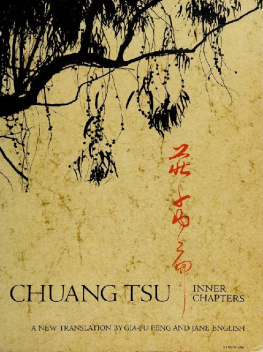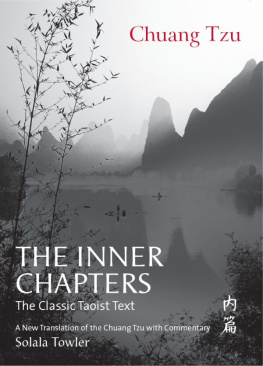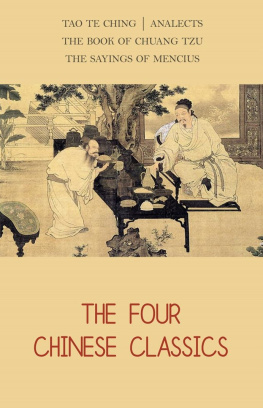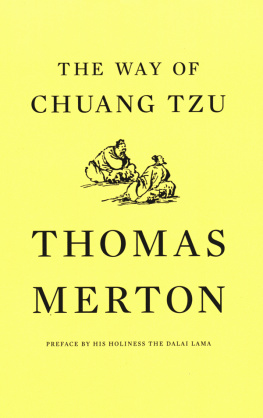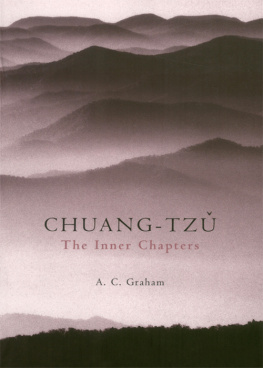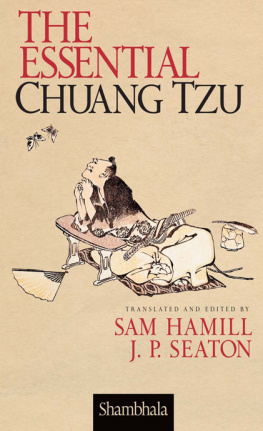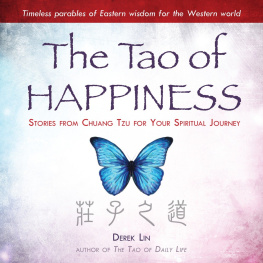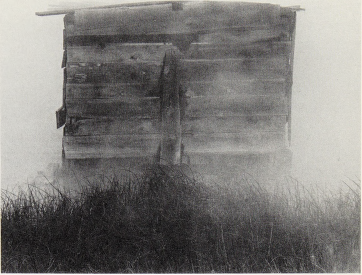
Zhuang zu: Inner chapters
Pages
Zhuang zu: Inner chapters
Zhuangzi
This book was produced in EPUB format by the Internet Archive.
The book pages were scanned and converted to EPUB format automatically. This process relies on optical character recognition, and is somewhat susceptible to errors. The book may not offer the correct reading sequence, and there may be weird characters, non-words, and incorrect guesses at structure. Some page numbers and headers or footers may remain from the scanned page. The process which identifies images might have found stray marks on the page which are not actually images from the book. The hidden page numbering which may be available to your ereader corresponds to the numbered pages in the print edition, but is not an exact match; page numbers will increment at the same rate as the corresponding print edition, but we may have started numbering before the print book's visible page numbers. The Internet Archive is working to improve the scanning process and resulting books, but in the meantime, we hope that this book will be useful to you.
The Internet Archive was founded in 1996 to build an Internet library and to promote universal access to all knowledge. The Archive's purposes include offering permanent access for researchers, historians, scholars, people with disabilities, and the general public to historical collections that exist in digital format. The Internet Archive includes texts, audio, moving images, and software as well as archived web pages, and provides specialized services for information access for the blind and other persons with disabilities.
Created with abbyy2epub (v.1.7.2)
CHUANG TSU CHAPTERS
A NEW TRANSLATION BY GIA-FU FENG AND JANE ENGLISH
Also by Gia-fu Feng and Jane English: LAO TSU/TAO T CHING
By Gia-fu Feng (with Jerome Kirk):
TAI CHIA WAY OF CENTERING& I CHING
CHUANG TSU
INNER CHAPTERS
'PHOTOGRAPHY BY JANE ENGLISH CALLIGRAPHY BY GIA-FU FENG ,
'
\r
w
CHUANG TSU
INNER
CHAPTERS
A NEW TRANSLATION BY GIA-FU FENG AND JANE ENGLISH
VINTAGE BOOKS A DIVISION OF RANDOM HOUSE, NEW YORK
VINTAGE BOOKS EDITION, March I974
Copyright 1974 by Gia-fu Feng and Jane English
All rights reserved under International and Pan-American Copyright Conventions. Published in the United States by Random House, Inc., New York, and simukaneously in Canada by Random House of Canada Limited, Toronto. Originally published by Alfred A. Knopf, Inc., in 1974.
Library of Congress Cataloging in Publication Data:
Chuang-tsu. Inner chapters.
Translation of a portion of Nan-hua chen ching. I. Title. [BL1900.C5F38 1974b] 299'.5148^2 73-20292
ISBN 0394-719905
Cover photograph by Jane English.
Cover design by Clint Anglin.
The photograph of Jane English on pa^e 163 is by Sue Blacker. Manufactured in the United States of America
CONTENTS
Chapter I | Happy W andering 2 |
Chapter 2 | The Equality of All Things |
Chapter 3 | The Secret of Growth 50 |
Chapter 4 | Human Aftairs 60 |
Chapter 5 | Signs of Full Virtue 90 |
Chapter 6 | The Great Master no |
Chapter 7 | The Sage King 144 |
Digitized by the Internet Archive in 2019 with funding from Kahle/Austin Foundation
https://archive.0rg/details/zhuangzuinnerchaOOOOzhua
CHUANG TSU
Very little is known about Chuang Tsu and that little is inextricably wcnen into legend* It is said that lie was a contemporary ol: Menciusan ocial in the Lacquer Garden of Meng in Honan Province around the fourth century B.C Chuang Tsu was to Lao Tsu as St* Paul was to
Jesus and Plato to Socrates, He developed the doctrines of Taoism with rigorous logic* His fables and h uni or are imaginative and poetic, reflecting a brilliant and original mind. He advocated relativity with regard to all standards and values.
He is at once a mystic and a revolutionary* The rhythm of life and its organic vision, an idea poetically implied by Lao Tsu, is brought to perfect expression
in the writings oi: Chuang Tsu. While the other philosophers were busying themselves with the practical matters of government and rules ot conduct, Chuang Tsu transcended the whang chen the illusory dust of the worldthus anticipating Zen Buddhism and laying the metaphysical toundation tor a state of emptiness or ego transcendence.With imagery and fantasy, he captures the depth ot Chinese thinking.
The seven *'Inner Chapters'' presented in this translation are accepted by scholars as being definitely the work ol: Chuang Tsu. Another twenty-six chapters are of questionable origin; they are interpretations and developments of his teaching and may have been added by later commentators*
CHUANG TSU
INNER CHAPTERS
CHAPTER ONE
HAPPY WANDERING
r^rl ^ i,;^ ^^/
ii
'P3X5^/V
'3\'V
'f5-I 4^
&IV^
\^V'-L
In the Northern Ocean there is a fish called Kun which is many thousand li in size. It changes into a bird named Peng whose back is many thousand li in breadth.When it rises and flies, its wings are like clouds filling the sky.
When this bird moves across the ocean, it heads for the South Sea, the Celestial Lake. In Chi Hsiehs record of wonders it says: ''When Peng is heading toward the Southern Ocean it splashes along the water for three thousand li. It rises with the wind and wings its way up to ninety thousand li; it flies for six
months, and then it rests/' Heat shimmers in the air like galloping horses, dust floats like the morning mist, and living creatures are blown about in the sky.
The sky is blue* Is that really so?
Or does it only look blue because it stretches off into infinity? When Peng looks down from above, it will also seem blue. A large boat draws a great deal of water. Pour a cup oi water into a hollow in the ground, and a mustard seed can float there like a little ship. Place the cup in it, and it will not movebecause the water is shallow and the boat is large. Only at a certain height is there enough air space tor a great wingspan* So Peng rises to ninety thousand li, and there is enough air below him. Then he mounts the wind, and with the blue sky at his back, and nothing in his way, he heads tor the south.
*^wV
^1
$\ J^\^\ 4^t^ >^^^'^^/> J
A cicada and a young dove laugh at Peng, saying, When we try hard we can reach the trees, but sometimes we fall short and drop on the ground. How is ir possible to rise ninety thousand li and head south?" It you go into the country, you take enough food for three meals and come back with your stomach as full 3S e\er. II: you travel a hundred li, you grind enough grain i:or overnight stay. It you travel a thousand li, you must have three months supply .What do these two small creatures know? Little
Next page
